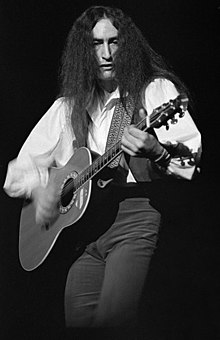"The distance between David and the rest had grown to unworkable proportions," according to Blows. "It's a tragedy to say it but David was one of those classic people who could not face up to the fact that things were wrong and he looked for solace in a bottle," commented Bron. In July 1976, after the final show of a Spanish tour, Byron was sacked. Soon bassist John Wetton announced he was quitting. Obviously he was not comfortable in the band, nor were his colleagues with him. Hensley later explained, "When he joined, we thought that we could replace a great bass player (Thain) with another great bass player, but we ignored the personality factor, which is crucial. It was like grafting on a new piece of skin but it just didn't work—the body rejected it."
Post-David Byron period (1977–1981)
Uriah Heep recruited bassist Trevor Bolder (ex-David Bowie, Mick Ronson), and after having auditioned David Coverdale (Deep Purple, Whitesnake), Ian Hunter and Gary Holton (Heavy Metal Kids), brought in John Lawton, formerly of Lucifer's Friend and the Les Humphries Singers, with whom they turned totally away from fantasy-oriented lyrics and multi-part compositions back towards a more straightforward hard rock sound typical of the era. Box later said, "Image-wise he wasn't quite what we were looking for, but his pipes were perfect and so we went for the music end of it." Hensley agreed: "He had a voice that I thought would give a new dimension."
Firefly was released in February 1977, displaying "renewed effervescence and energy in unveiling what was clearly a new beginning for Heep" (per. K. Blows), "a new vigour and confidence" (according to a Record Mirror review) and also the new singer's abilities: the latter (according to AllMusic), although lacking the multi-octave range of David Byron, "…boasted an impressive and emotionally rich hard rock voice that instantly jelled with the Uriah Heep sound."

Niciun comentariu:
Trimiteți un comentariu